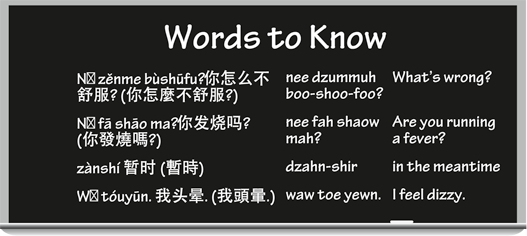Chinese For Dummies (130 page)
Read Chinese For Dummies Online
Authors: Wendy Abraham
 YÇu méiyÇu jiÇng YÄ«ngwén de dà ifu?
YÇu méiyÇu jiÇng YÄ«ngwén de dà ifu?
æ没æ讲è±æç大夫
?
(
ææ²æè¬è±æç大夫
? (yo mayo jyahng eeng-one duh dye-foo?) (
Are there any English-speaking doctors?
)
When you finally get someone on the line who can help you, you need to know what to say to get immediate help:
 WÇ bèi rén qiÇng le.
WÇ bèi rén qiÇng le.
æ被人æ¢äº
. (
æ被人æ¶äº
.) (waw bay run chyahng luh.) (
I've been robbed.
)
 WÇ yà o huì bà o yÃge chÄ huò.
WÇ yà o huì bà o yÃge chÄ huò.
æè¦æ±æ¥ä¸ä¸ªè½¦ç¥¸
. (
æè¦å¯å ±ä¸åè»ç¦
.) (waw yaow hway baow yee-guh chuh hwaw.) (
I'd like to report a car accident.
)
 YÇu rén shòu shÄng le.
YÇu rén shòu shÄng le.
æ人å伤äº
. (
æ人åå·äº
.) (yo run show shahng luh.) (
People are injured.
)
Receiving Medical Care
It's everyone's greatest nightmare â getting sick and not knowing why or how to make it better. If you suddenly find yourself in the
yīyuà n
å»é¢
(
é«é¢
) (ee-ywan) (
hospital
) or otherwise visiting an
yÄ«shÄng
å»ç
(
é«ç
) (ee-shung) (
doctor
), you need to explain what ails you â often in a hurry. Doing so may be easier said than done, especially if you have to explain yourself in Chinese (or help a Chinese-speaking victim who's having trouble communicating), but don't worry. In the following sections, I walk you through your doctor's visit step by step.
 When you travel, don't forget to bring your prescription medicines. Carry them in a separate carry-on bag or in your purse. You don't want to pack them in a piece of check-in luggage, never to be seen again if the luggage gets lost.
When you travel, don't forget to bring your prescription medicines. Carry them in a separate carry-on bag or in your purse. You don't want to pack them in a piece of check-in luggage, never to be seen again if the luggage gets lost.
 Here are a couple of additional medical-emergency tips for traveling in China:
Here are a couple of additional medical-emergency tips for traveling in China:
 Unless you're in a big city like Beijing or Shanghai, if you get seriously ill while staying in mainland China, your best bet is to fly to Hong Kong or back home for medical care. Don't forget to check into evacuation insurance before you go.
Unless you're in a big city like Beijing or Shanghai, if you get seriously ill while staying in mainland China, your best bet is to fly to Hong Kong or back home for medical care. Don't forget to check into evacuation insurance before you go.
 Warning:
Warning:
Chinese people don't have O-negative blood, so Chinese hospitals don't store it. If you have a medical emergency in China that requires O-negative blood, you should check directly with your country's nearest embassy or consulate for help. You may need to be airlifted out to get the appropriate care. You may also want to take your own hypodermic needles in case you need an injection because you can't guarantee that the needles you may come across are sterilized. Better safe than sorry away from home.
Deciding whether to see a doctor
If your luck is good, you'll never need to use any of the phrases I present in this chapter. If you end up running out of luck, however, keep reading. Even if you've never smoked a day in your life, you can still develop a cough or even bronchitis. Time to see a
yÄ«shÄng.
Talkin' the Talk
DÃ lÃn and his wife, MiÇn, are on their first trip back to China in 20 years. MiÇn becomes concerned about a sudden onset of dizziness. The two discuss her symptoms.
DÃ lÃn:
NÇ zÄnme bùshÅ«fu?
nee dzummuh boo-shoo-foo?
What's wrong?
MiÇn:
WÇ gÇnjué bùshÅ«fu kÄshì bù zhÄ«dà o wÇ déle shénme bìng.
waw gahn-jweh boo-shoo-foo kuh-shir boo jir-daow waw duh-luh shummuh beeng.
I don't feel well, but I don't know what I have.
DÃ lÃn:
NÇ fÄ shÄo ma?
nee fah shaow mah?
Are you running a fever?
MiÇn:
MéiyÇu, dà nshì wÇ tóuyÅ«n. YÄxÇ wÇ xÅ«yà o kà n nèikÄ yÄ«shÄng.
mayo, dahn-shir waw toe-yewn. yeh-shyew waw shyew-yaow kahn nay-kuh ee-shung.
No, but I feel dizzy. Perhaps I need to see an internist.
DÃ lÃn calls the nearest medical clinic to make an appointment and then returns to MiÇn.
DÃ lÃn:
WÇ jÄ«ntiÄn xià wÇ sÄn diÇn zhÅng yuÄ le yÃge shÃjiÄn. NÇ zuì hÇo zà nshà zuò xià lái.
waw jin-tyan shyah-woo sahn dyan joong yweh luh ee-guh shir-jyan. nee dzway how dzahn-shir dzwaw shyah-lye.
I've made an appointment for 3:00 this afternoon. In the meantime, you'd better sit down for a while.

 Although verbs don't express tense in Chinese, you often connect them to things called
Although verbs don't express tense in Chinese, you often connect them to things called
aspect markers,
which come directly after the verb and indicate the degree of completion of an action. The aspect markers
xià lái
ä¸æ¥
(
ä¸ä¾
) (shyah-lye) and
xià qù
ä¸å»
(shyah-chyew) are two such examples.
Xià lái
refers to an action that slowly turns into a non-action or a calmer state, such as
zuò xià lái
åä¸æ¥
(dzwaw shyah-lye) (
to sit down and rest
) in the previous Talkin' the Talk section.
Xià qù
refers to continuing action.